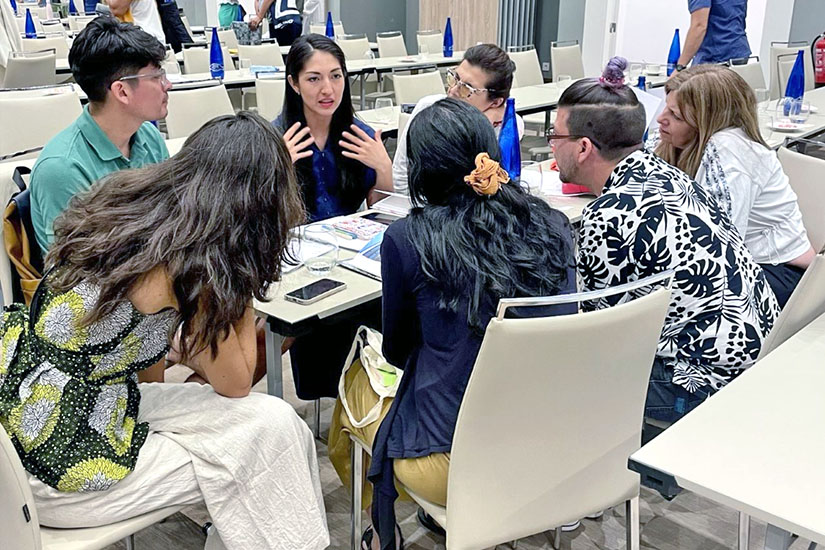Resources for the introduction of SGI-Spain’s discussion meetings
[T]he five characters of the daimoku [Nam-myoho-renge-kyo] constitute the Buddhism of sowing that is suitable for the present time.
↳ OTT, page 110. The Record of the Orally Transmitted Teachings are a collection of Nichiren Daishonin’s oral teachings about the Lotus Sutra expounded during his years at Mount Minobu, where he established himself in May 1274 until the 8 of September 1282, just a few weeks before he passed away. These teachings were registered and collected in two volumes by his disciple and successor Nikko Shonin. In order to understand the first part of this quote, we must note that even though Nam-myoho-renge-kyo is written with seven Chinese characters, Myoho-renge-kyo is written with five (nam o namu adds two characters) and that the Daishonin frequently uses both terms as synonyms.
At this very moment, our honorable members the world over are engaging in pleasant and lively conversations to sow the seeds of the Mystic Law. Those seeds are sprouting, and the age is coming when the flowers of happiness and hope that grow from them will bloom across our planet in beautiful profusion. Our efforts to sow the seeds of Buddhahood constitute a great dialogue movement for peace that will shine brilliantly in human history.
What is the present significance of our dialogue movement?
First, sowing the seeds of Buddhahood is a way to create connections. It is the sacred task of bringing people in touch with the Mystic Law and opening the way to happiness for all.
The Lotus Sutra mentions the sowing of seeds of enlightenment in past ages, but these were directed at those who actively sought the teaching. In the Latter Day of the Law, however, when self-interest and the pursuit of momentary pleasures prevail, there may seem to be very few who seek a profound teaching of their own volition.
That’s why our efforts to sow the seeds of the Mystic Law are a magnificent endeavor to forge connections with Buddhism that only the Bodhisattvas of the Earth can achieve. The more we help one person after another form such connections and plant seeds that can lead all to enlightenment in the rich earth of their hearts, the more surely and steadily our philosophy of respect for life will spread throughout society.
Second, sowing seeds of Buddhahood means not discriminating; it is a noble undertaking to bridge divisions and bring people together.
The Buddhism of sowing embraces people of all capacities or levels of understanding, transcending all differences, including race, nationality, and gender. It is the polar opposite of any tendency to discriminate against or denigrate others.
That is what makes our efforts to sow the seeds of the Mystic Law a far-reaching journey to create harmony and cooperation for the global human family. The Buddha’s all-embracing compassion, free of discrimination, vanquishes the ignorance of humanity that causes division.
Third, sowing seeds of Buddhahood means having faith; it is the admirable cause of promoting a way of life based on respect for others.
We don’t know when the seeds we have sown in people’s lives will sprout and blossom, but we respect the Buddha nature of each person and pray, wait for, and believe that these seeds will flower.
Mistrust and suspicion of others is at the root of the serious divisions that plague our world today. That’s why our efforts to sow the seeds of the Mystic Law are an endless journey of respecting others’ humanity. By believing in people’s inherent goodness as we sow these seeds, we can conquer the doubt and suspicion darkening our world.[1]

The programme of SGI-Spain’s 2024 Summer Course (please see the news in section “Actualidad”) included discussion meetings. The participants were spread out in none other than 40 group. These meetings, which were held on the first and second days, offered an opportunity to get to know fellow members of other areas of the country and share experiences and determinations.
Mailbox: prensa@ediciones-civilizacionglobal.com
[1] ↑ Passage from the “Estudio” (3/3) section of this issue.

